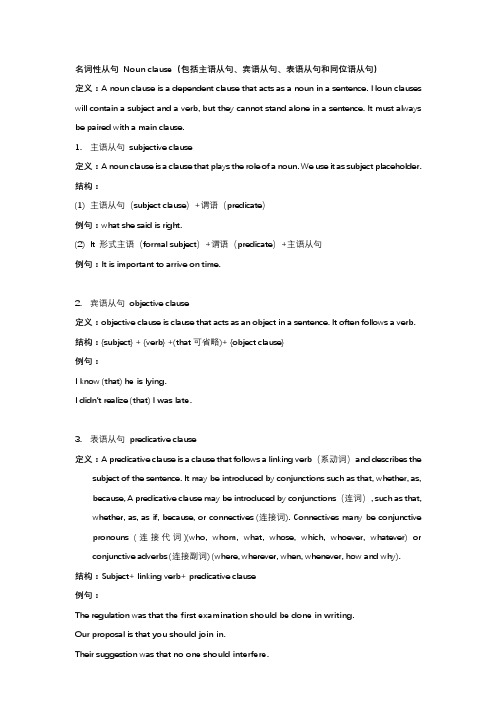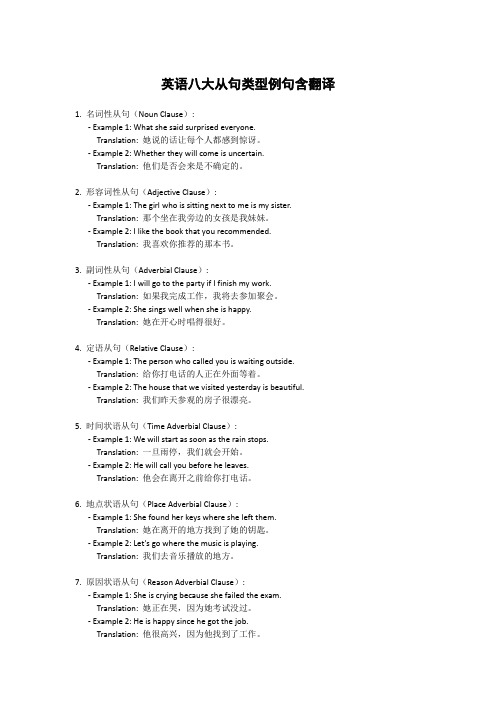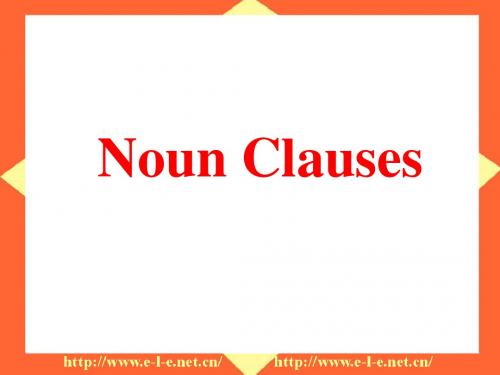(完整版)nounclause名词性从句
高中英语教资语法点-从句

名词性从句 Noun clause(包括主语从句、宾语从句、表语从句和同位语从句)定义:A noun clause is a dependent clause that acts as a noun in a sentence. Noun clauses will contain a subject and a verb, but they cannot stand alone in a sentence. It must always be paired with a main clause.1.主语从句 subjective clause定义:A noun clause is a clause that plays the role of a noun. We use it as subject placeholder.结构:(1)主语从句(subject clause)+谓语(predicate)例句:what she said is right.(2)It 形式主语(formal subject)+谓语(predicate)+主语从句例句:It is important to arrive on time.2.宾语从句 objective clause定义:objective clause is clause that acts as an object in a sentence. It often follows a verb. 结构:{subject} + {verb} +(that可省略)+ {object clause}例句:I know (that) he is lying.I didn’t realize (that) I was late.3.表语从句 predicative clause定义:A predicative clause is a clause that follows a linking verb(系动词)and describes the subject of the sentence. It may be introduced by conjunctions such as that, whether, as, because, A predicative clause may be introduced by conjunctions(连词), such as that, whether, as, as if, because, or connectives (连接词). Connectives many be conjunctive pronouns (连接代词)(who, whom, what, whose, which, whoever, whatever) or conjunctive adverbs (连接副词) (where, wherever, when, whenever, how and why).结构:Subject+ linking verb+ predicative clause例句:The regulation was that the first examination should be done in writing.Our proposal is that you should join in.Their suggestion was that no one should interfere.注:if不能引导表语从句。
名词性从句 - Noun Clauses

插入语
How long do you think this fine weather will last? How long do you think will this fine weather last?
宾
宾语从句 Object Clause
有时用it作形式宾语,真正的宾语从句置于句末。 常见的动词有:think, consider, believe, feel, find, make;
appreciate, dislike, hate, like; have, put, take; depend/rely on(相信;指望),see to(确保), answer for(保证)
宾
宾语从句 Object Clause
有时用it作形式宾语,真正的宾语从句置于句末。
He has made it clear that he will not give in. We all thought it a pity that the conference should have
Noun Clauses
Y
UN ANG SENIOR HIGH SCHOOL
主
主语从句 Subject Clause
状 状语从句
补 定语从句
宾 宾语从句 Object Clause
谓
表语从句 Predictive Clause
同
定
表
பைடு நூலகம்
同位语从句 Appositive Clause
名词性从句 Noun Clause
宾
宾语从句 Object Clause
注意:疑问词 + do you think/believe/suppose/expect/imagine + 陈述句
名词性从句nounclause

主语从句的用法
总结词
主语从句的用法包括表示时间、原因、条件等,可以 用来强调主句的主语,或者使句子结构更加紧凑。
详细描述
在表示时间时,主语从句可以表示过去、现在或未来的 时间点,例如"When he comes back, I will tell him the news."。在表示原因时,主语从句可以用来解释主 句所描述的对象或事件的原因,例如"That he was late for class was because he got up late this morning."。在表示条件时,主语从句可以表示一个假 设条件,例如"If you study hard, you will succeed." 。此外,主语从句还可以用来强调主句的主语,或者使 句子结构更加紧凑,例如"What he said is true."。
连接代词
如what、who、whose、which等,引导宾语从句表示“什么、谁、哪”等含义。
连接副词
如when、where、how、why等,引导宾语从句表示时间、地点、方式、原因等含义。
宾语从句的用法
01
宾语从句可以置于句末,也可以 置于句中,通常由逗号与前面的 内容隔开。
02
当宾语从句较长时,可以放在句 末,以保持句子结构的平衡。
详细描述
同位语从句可以用来对抽象名词进行详细的 解释或补充说明,使句子更加完整、清晰。 使用同位语从句可以使句子结构更加紧凑, 提高语言的表现力。
THANKS FOR WATCHING
感谢您的观看
对表语进行补充说明,例如:The fact is that we won the game. (事实是我们赢了比赛。)
英语八大从句类型例句

英语八大从句类型例句含翻译1. 名词性从句(Noun Clause):- Example 1: What she said surprised everyone.Translation: 她说的话让每个人都感到惊讶。
- Example 2: Whether they will come is uncertain.Translation: 他们是否会来是不确定的。
2. 形容词性从句(Adjective Clause):- Example 1: The girl who is sitting next to me is my sister.Translation: 那个坐在我旁边的女孩是我妹妹。
- Example 2: I like the book that you recommended.Translation: 我喜欢你推荐的那本书。
3. 副词性从句(Adverbial Clause):- Example 1: I will go to the party if I finish my work.Translation: 如果我完成工作,我将去参加聚会。
- Example 2: She sings well when she is happy.Translation: 她在开心时唱得很好。
4. 定语从句(Relative Clause):- Example 1: The person who called you is waiting outside.Translation: 给你打电话的人正在外面等着。
- Example 2: The house that we visited yesterday is beautiful.Translation: 我们昨天参观的房子很漂亮。
5. 时间状语从句(Time Adverbial Clause):- Example 1: We will start as soon as the rain stops.Translation: 一旦雨停,我们就会开始。
高中课件 名词性从句(Noun clause)

3. We’re worried about _w__h_e_th__er_ he is safe.
4. I don’t know _w__h_e_t_h_e_r/_i_f _ he is well or not.
5. I don’t know _w_h_e_t_h_e_r_ or not he is well.
的后面用it作形式宾语时,that不省略。
I find it necessary that we should study English.
2. 及物动词后有两个宾语从句时,第 二个that不可以省略。
He said (that) he would go there the next day and that his family
if / whether
1. I asked her _if_/_w__h_e_th__er_ she had a bike.
2. _W__h_e_th_e_r_we will hold a party in the open air tomorrow depends on the weather.
2.I don't know when will he come.
I don't know when he will come.
规律:名词从句中须使用陈述语序!
How to judge a clause: 学习名从要知道; 及物动词最重要; 动词之前叫主从; 动词之后是宾从。 系动词也贼重要; 它的后面跟表从; 千万不能忘介词; 它的殿后亦宾从
关于that引导的主语从句
That he is still alive is unbelievable.
That we shall be late is certain.
Noun+Clause+名词性从句

Commonly used connectors
be动词 感官动词 持续性系动词 变化类系动词 表象类系动词 终止系动词
am, is, are, was, were look, sound, taste, smell, feel keep, stay, remain get, become, grow, turn, go
appear, seem prove, turn out
As an Object
The various types of objects include; direct objects, indirect objects, and prepositional objects. A Direct Object A direct object directly receives a verb action. •Do you understand what the homework entails? •My daughter will wear whichever dress I hand to her. An Indirect Object An indirect object identifies the individual to whom/ for whom a verb action is done. •Always honor whichever person you serve for an excellent service. •Ensure you send whoever taught you a graduation-invitation card. As a Prepositional Object A prepositional object usually follows a noun clause. •I want to work with whoever is excellent in the skill. •It is vital to research about why certain things exist.
名词性从句完整版

名词性从句一.概念在句子中起名词作用的句子叫名词从句(Noun Clauses).名词从句的功能相当于名词词组,它在复合句中能担任主语、宾语、表语、同位语、介词宾语等,因此根据它在句中不同的语法功能,名词从句又可分别称为主语从句、宾语从句、表语从句和同位语从句。
二.语序所有名词性从句都是引导词(在最前)+陈述句语序(即:主语在前,谓语在后.即使从句表达的是疑问含义).What we can't get seems better than what we have.The photographs will show you what our village looks like.He asked how much I paid for the violin.三.引导词引导名词性从句的引导词类别词义在从句中的作用从属连词that无任何词义仅起连接作用,在从句中不充当任何句子成分从属连词whether和if(是否)意为“是否”,表明从句意义的不确定性起连接作用,在从句中不充当任何句子成分关系代词who, whom, what,which,whose,whoever, whomever, whatever, whichever 有各自自身的意义起连接作用,并在从句中充当主、表、宾、定语等关系副词when, where, why, how, however, whenever, wherever 有各自自身的意义起连接作用,并在从句中充当状语注意:名词性从句引导词,只有that在引导主语从句后置时,以及在引导宾语从句时有时可以省.其它情况下,以及其它名词性从句引导词均不能省.注意:只有在引导宾语从句(有些情况下不能用if代替whether)以及whether引导主语从句后置时才可用if.其它情况下,以及引导其它名词性从句时均不能用if.四.分类详解主语从句在句子中作主语的句子叫主语从句.1.由从属连词that, whether引导的主语从句:▲that引导主语从句放在句首时,that不可省.That light travels in straight line is known to all. (that不能省)That he will succeed is certain. (that不能省)That he is still alive is a wonder. (that不能省)That the baby could speak made his parents very happy. (that不能省)That she became an artist may have been due to her father’s influence. (that不能省)______ you don’t like him is none of my business.(1992上海高考试题)A. WhatB. WhoC. ThatD. WhetherAnswer:C▲whether引导的主语从句一般位于句首.也可用it作形式主语,将其后置,此时whether可换为if. (if引导主语从句时,只能用it作形式主语,放在句首,而将if引导的主语从句放到句末.) Whether she will come or not is still a question.Whether the old couple enjoy the trip remains to be proved.Whether we will hold a party in the open air tomorrow depends on the weather.It was a problem whether they would support us.It remains to be seen whether it will do us harm or good.It is uncertain if he will leave for Beijing tomorrow.2.由关系代词who/whoever; whom/whomever(少); what/whatever; which/whichever; whose 引导的主语从句.Who will the win the scholarship is unknown.Who will be sent abroad to further his studies is not announced.Who murdered the present is being investigated.Whoever comes is welcome.Whoever leaves the room last ought to turn off the lightsWhoever breaks the rule must be punishedWhoever breaks this law deserves a fine.Whoever wants to see this film can go with us tonight.Whoever helped to save the drowning girl is worth praising.Who/whom he will work with is still a secret.Whom we must study for is a question of great importance.Whoever you fell in love with has nothing to do with me.whoever既用作主格也用作宾语(作宾语时不宜用whomever,因为在现代英语中whomever 已几乎不用).What you have done might do harm to other people.What must be done has been done.What is worth doing is worth doing well.What you said just now hurt her feelings.What impressed me most was his great responsibility for his work.What was once regarded as impossible has now become a reality.What surprised me most was that such a little girl could play the violin so well.Whatever the parents do is for their children.Whatever you say is of no use now.Whatever was said here must be kept secret.Which school will win the prize is not known.I read it in some book or other, does it matter which it was?Whichever you take will be yours.Whichever book you choose doesn’t matter to me.Whichever of us gets home first starts cooking.Whose relatives lost their life in the shocking earthquake hasn’t been announced.3.由关系副词when; where; why; how引导的主语从句.When the plane is to take off hasn’t been announced.Where the heroine went is not mentioned at the end of the story.Where the English evening will be held is still under discussion.Why he often comes here is known to us all.Why he didn't come here is not clear to anyone.Why the sun in the morning looks bigger than the sun at noon is very interesting.How he was successful is still a puzzle.How he managed to finish the composition in such a short time is still a mystery.How and why Einstein had come to Princeton, New Jersey is a story of struggle, success, and sadness.How much water is flowing can be measured easily. 水的流量是多少……主语从句的主谓一致问题①:单个的主语从句作主语,谓语动词用单数;如果两个或两个以上的主语从句作主语,谓语动词用复数.When and where he was born hasn’t been found.How and why he came to the lonely small island is still a mystery.When the person was murdered and why he was murdered are still unknown.When they will start and where they go have not been decided yet.②:what引导的主语从句,谓语动词可由表语来决定.What we need are women workers.What we need is more time and money.4.it作形式主语引导主语从句如果主语从句太长,为避免句子结构头重脚轻,我们可用it作形式主语,而把主语从句放在主句谓语部分之后.这样句子结构就更加平衡.此时主语从句的引导词一般是that(一般不省,亦可省略),也可以是其它引导词.▲It + be +形容词+ that-从句It’s(im)possible/probable/important/necessary/fortunate/certain/clear/obvious/likely/natural/ strange that…It is probable that he told her everything.It's strange that he didn't come yesterday.It is likely that there will be a storm tomorrow.主语从句中的虚拟语气:其中在it’s natural/important/ necessary/strange that…结构中,主语从句常用should +do的虚拟语气(美语中省去should).It was necessary that we (should) make everything ready ahead of time.It is important that every pupil (should) be able to understand the rule of school.It is natural that she should do so.It is essential that these application forms be sent back as early as possible.It is necessary that a college student ____at least a foreign language.(上海1993)A. mastersB. should masterC. masteredD. will masterAnswer:B▲It + be +名词+ that-从句It’s a pity/a shame/an honor/a fact/a surprise/a question/good news/no wonder/ common knowledge/high time that…It is a pity that you didn’t attend the lecture yesterday.It is a pity that she has made such a mistake.It’s no wonder that you’ve achieved so much progress.主语从句中的虚拟语气:其中在此结构中若为surprise, a pity, a shame, no wonder等表示惊奇、惋惜的名词时,主语从句常用should +do的虚拟语气(美语中省去should).若为advice, desire, demand, order, proposal, recommendation, requirement, suggestion等表示建议、请求、要求、命令等名词时,须用should +do的虚拟语气(美语中省去should).It is my proposal that he be sent to study further abroad.It’s a pity that I (should) miss the lecture.▲It + be + -ed 分词+ that-从句It’s said/reported/believed/thought/announced/decided/known to all /must be pointed out/must be admitted that…It is reported that the number of wild animals in Africa is decreasing.It’s announced that the hostages have been released.It’s decided that the meeting has been put off till next Monday.It’s known to us how he became a writer.其中在此结构中若为request, demand, require, beg, propose, suggest, recommend, advise, order, command, urge, desire等表示建议、请求、要求、命令等的动词,则主语从句中须用should +do的虚拟语气(美语中省去should).It is required that nobody (should) smoke here.It is desired that we(should)get everything ready this evening.It is suggested that we (should) hold a meeting next week.▲It +不及物动词+ that-分句It seems/appears/happens (to sb)/occurred to sb/turned out/doesn’t matter /make no difference that…It seems to me that you object the plan.It happened to me that I had been out when he called.It occurred to me that I forgot to shut the windows.It doesn’t matter whether he likes or not.It makes no difference that you will go today or tomorrow.常将seem, appear 等后的从句的否定转移到前面。
noun clause 名词性从句

7. The question is ___ we can’t go there today. A. that B. what C. which D. when 8. The question is ____ it is worth doing.
A. if
B. whether C. which D. what
3. It _____ Joe drives badly. A. thought that B. thinks that
C. is thought that D. is thought that
4. My advice is thatse.
A. keep B. would keep
引导包括宾语从句在内的其他名词性从句。
2)宾语从句中, whether常与 or not搭配, 可以说whether or not, 而不说if or not. I don' t care whether or not she will attend the meeting.
3)whether可用在介词后, 或带to不定式 前, if则不可。 She doesn’t know whether to get married now or wait. I haven’t settled the question of whether I’ll go back home.
Practice
1. It now appears ___ they are in need of
help.
A. that
B. which
C. what D. how
2. It is good news ___ they will arrive in a few days. A. which B. what C. that D. how
- 1、下载文档前请自行甄别文档内容的完整性,平台不提供额外的编辑、内容补充、找答案等附加服务。
- 2、"仅部分预览"的文档,不可在线预览部分如存在完整性等问题,可反馈申请退款(可完整预览的文档不适用该条件!)。
- 3、如文档侵犯您的权益,请联系客服反馈,我们会尽快为您处理(人工客服工作时间:9:00-18:30)。
noun (nominal) clauseDEFINITIONIn English grammar, a noun clause is a dependent clause that functions as anoun (that is, as a subject, object, orcomplement) within a sentence. Also known as a nominal clause.Two common types of noun clause in English are that-clausesand wh-clauses:•that-clause: I believe that everything happens for a reason.•wh-clause: How do I know what I think, until I see what I say? See Examples and Observations below.Also see:•Practice in Building Sentences With Noun Phrases and Noun Clauses•Anticipatory It and Dummy It•Complement Clause•Extraposition•Gerund•Infinitive•Noun Phrase•Putative Should•That-Clause•What-ClauseEXAMPLES AND OBSERVATIONS•"When Mrs. Frederick C. Little's second son arrived, everybody noticed that he was not much bigger than a mouse."(E.B. White, Stuart Little, 1945)•"What I like doing most of all in the evenings, these days, is sitting in a gormless stupor in front of the television, eatingchocolate."(Jeremy Clarkson, The World According to Clarkson. Penguin Books, 2005)•"A university is what a college becomes when the faculty loses interest in students."(John Ciardi, Saturday Review, 1966)•"I know that there are things that never have been funny, and never will be. And I know that ridicule may be a shield, but it is not a weapon."(Dorothy Parker)•"I believe that there is a subtle magnetism in Nature, which, if we unconsciously yield to it, will direct us aright."(Henry David Thoreau, "Walking")•"The thought of stars contributed to the power of his feeling. What moved him was a sense of those worlds around us, our knowledge however imperfect of their nature, our sense of their possessing some grain of our past and of our lives to come."(John Cheever, Oh What a Paradise It Seems. Random House, 1982)•"Whoever was the person behind Stonehenge was one dickens ofa motivator, I'll tell you that."(Bill Bryson, Notes From a Small Island. Doubleday, 1995) •"How we remember, what we remember, and why weremember form the most personal map of our individuality."(Christina Baldwin)•"How people knew when they were being trailed he found himself unable to imagine."(Edmund Crispin [Robert Bruce Montgomery], Holy Disorders, 1945)•"This is the story of what a Woman's patience can endure, and of what a Man's resolution can achieve."(Wilkie Collins, The Woman in White, 1859)•"I knew exactly how clouds drifted on a July afternoon, what rain tasted like, how ladybugs preened and caterpillars rippled, what it felt like to sit inside a bush.”(Bill Bryson, The Life and Times of the Thunderbolt Kid.Broadway Books, 2006)•"That dogs, low-comedy confederates of small children and ragged bachelors, should have turned into an emblem of having made it to the middle class—like the hibachi, like golf clubs and a second car—seems at the very least incongruous."(EdwardHoagland, "Dogs, and the Tug of Life")•Nominal Clauses as Direct Objects- "All sentences, then, are clauses, but not all clauses aresentences. In the following sentences, for example, the directobject slot contains a clause rather than a noun phrase. These are examples of nominal clauses (sometimes called 'noun clauses'):•I know that the students studied their assignment.•I wonder what is making Tracy so unhappy.These nominal clauses are examples of dependent clauses—in contrast toindependent clauses, those clauses that function ascomplete sentences."(Martha Kolln and Robert Funk, Understanding EnglishGrammar, 5th ed., Allyn and Bacon, 1998)- "A Colorado study found that the average homeless person cost the state forty-three thousand dollars a year, while housing that person would cost just seventeen thousand dollars."(James Surowiecki, "Home Free?" The New Yorker, September 22, 2014)•Noun-Clause Starters"We use various words to start noun clauses. . . ."These words include the word that, which in its role as a nounclause starter is not a relative pronoun, for it serves nogrammatical role in the clause; it just starts the clause. Forexample: The committee stated that it would follow the agent'spolicy. Here the noun clause serves the noun role of directobject of thetransitive verb stated. But a careful look at the clause reveals that the word that does not serve any role within the clause, other than simply to get it going."Other noun clause starters do serve grammatical roles within the clause. For example: We know who caused all the trouble. Here the noun clause starter is the relative pronoun who. Notice that inside the noun clause who serves as the grammatical subject of the verb caused."Additional words serve as noun clause starters. A relativeadverb can get one going: How he won the election mystified the pundits. So can a relative pronoun acting as an adjective: Weknow which career she will pursue. In these two sentences, how is an adverb modifying the verb won, and which is arelative-pronoun-adjective modifying the noun career."(C. Edward Good, A Grammar Book for You and I--Oops,Me! Capital Books, 2002)•"I have run,I have crawled,I have scaled these city walls,These city wallsOnly to be with you,Only to be with you.But I still haven't found what I'm looking for."。
